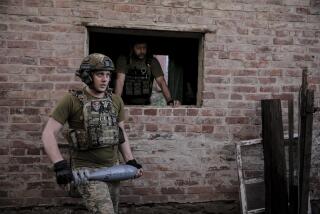A Pact Critical to the Nation’s Security
Ratification of the Chemical Weapons Convention is in America’s dearest national security interest. This is not a judgment I have come to lightly. But after 47 years in uniform and leadership of the U.S. military under Presidents Reagan and Bush, I consider this treaty’s benefits--to our troops, our citizens and our global leadership--far too important to squander. I strongly believe that this treaty is right for America and to reject it would be a serious mistake.
In judging an arms control agreement, the first question we in the military ask is, “What do we give up?” In this case, we give up nothing. After the Gulf War, the U.S. military determined that we did not need chemical weapons of our own to deter their use against us or our allies. Our overall strength is a much more credible and effective deterrent. That is why President Bush decided that America could renounce the possession and use of chemical weapons. Now that we are withdrawing from the chemical weapons business, it is in our interest to do everything in our power to encourage others to do the same.
The second question we ask ourselves is, “What do we gain?” This treaty’s rewards are impressive:
* Destruction of existing chemical weapons stockpiles around the world, which could threaten our troops and our citizens.
* New trade restrictions that will make it harder for rogue states and terrorists alike to acquire the materials they need to make chemical weapons and facilitate the tracking of such transactions.
* Greater access to information on foreign chemical weapons threats.
* Stronger authority to identify, investigate, apprehend and punish domestic groups attempting to make chemical weapons.
The third logical question is, “What will happen if we refuse to ratify?” The answer is, we’ll go from leading the world to joining the company of pariah nations.
* Others will use our absence from the treaty as an excuse to retain their own chemical weapons.
* Our chemical companies will be hit with the very trade restrictions that we helped design to put pressure on holdout countries. The Chemical Manufacturers’ Assn. estimates that this could result in the loss of hundreds of millions of dollars in sales and many jobs.
* Most important, our role on a host of international arms control and nonproliferation issues will be undermined. To opt out of this significant international agreement hardly befits the leader of the free world and the most powerful nation on the globe.
Gen. Norman Schwarzkopf recently told the Senate that he supports the convention because “by not ratifying . . . we align ourselves with nations like Libya and North Korea, and I’d just as soon not be associated with those thugs in this particular matter.” I strongly agree, for military and moral reasons as well.
I have examined the case against the convention, and on balance, do not find it persuasive. Some say the treaty is unverifiable. I have heard that argument time and again from those who oppose every attempt to limit weapons. They are making the perfect the enemy of the good; no agreement would satisfy them.
At present, chemical weapons are not illegal. By rendering clearly illegal their development and possession, the convention will strengthen our hand against chemical weapons outlaws; without it, we have no hand at all. Actually, the convention provides for unprecedented investigatory provisions, including short-notice inspections. Curiously, opponents want verifiability, but at the same time complain that the treaty allows too much access to private producers.
Others declare that the treaty is worthless unless every rogue state signs on. That’s like saying we shouldn’t have laws against murder until every killer surrenders. It’s the law abiders, not the law abusers, who should set the standards of civilized behavior. With the treaty, rogue states will face trade restrictions and, while not impossible, it will unquestionably be more difficult for them to acquire chemical weapons. More significant, the treaty will make any retaliatory steps we take more acceptable throughout the international community.
The Chemical Weapons Convention goes into effect on April 29. If we have not ratified by then, our nation will not have a seat on the treaty’s governing council. We will not even be allowed to vote at the treaty organization’s first meeting, at which decisions on the budget, key personnel issues and important implementation matters will be taken. Americans will not be able to serve as inspectors. In short, we will be denied a voice in the decisions likely to affect us most, as both a chemical weapons possessor and the country with the world’s leading chemical industry.
The clock is ticking. I urge the Senate to ratify the Chemical Weapons Convention now.
More to Read
Sign up for Essential California
The most important California stories and recommendations in your inbox every morning.
You may occasionally receive promotional content from the Los Angeles Times.










